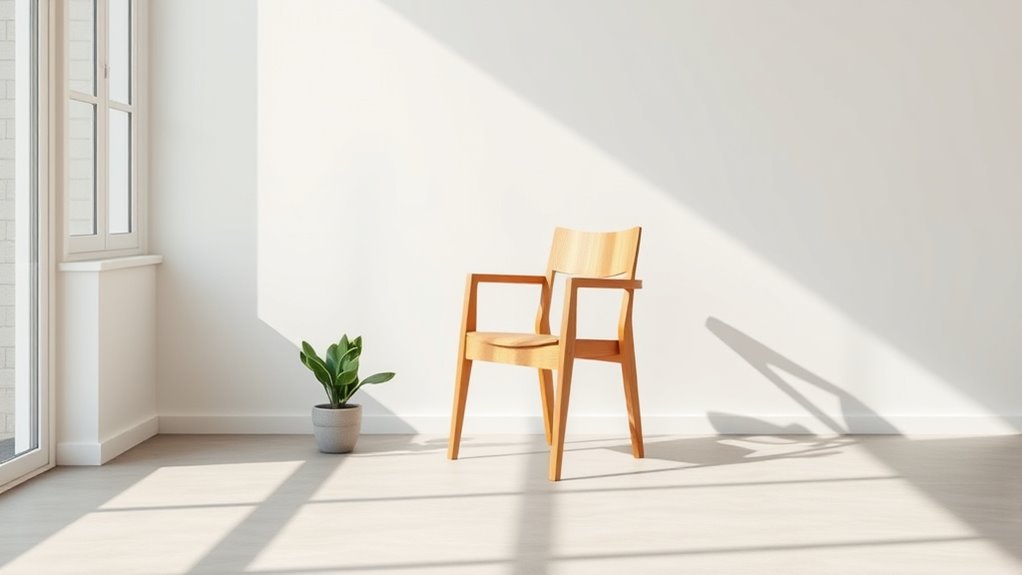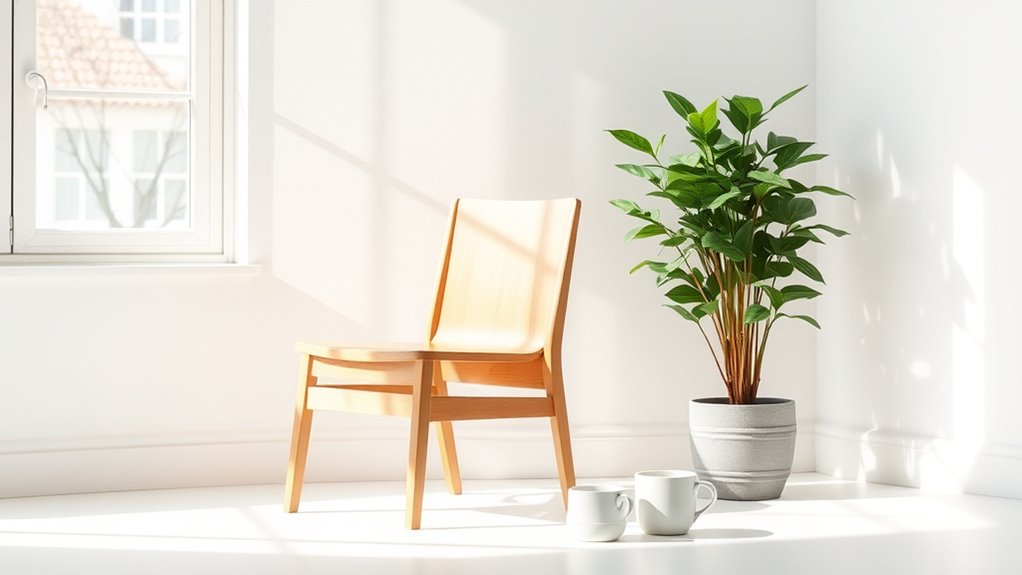By choosing minimalism, you actively reduce waste and lower your environmental impact. Owning fewer, high-quality items means less clutter and a smaller carbon footprint, especially when you pick eco-friendly and ethically made products. Simplifying your life encourages mindful purchases, reusing, and repurposing. Living with less also decreases energy consumption and decreases the demand for resource-intensive manufacturing. Keep exploring how this lifestyle can help protect the planet and create a more sustainable future.
Key Takeaways
- Owning fewer items reduces waste and resource consumption, aligning minimalism with eco-friendly practices.
- Choosing quality, sustainable products extends their lifespan, decreasing the need for frequent replacements.
- Mindful shopping encourages research on ethical brands, minimizing impulsive buys and environmental impact.
- Reusing and repurposing possessions lower clutter and promote a cycle of conscious ownership.
- Minimalist lifestyles cut energy use from fewer devices and promote sustainable living habits.

Have you ever wondered how simplifying your life can benefit the planet? Embracing minimalism isn’t just about decluttering your space; it’s a conscious choice to reduce waste and lessen your environmental impact. When you own fewer things, you naturally consume less, which means less energy used in production and transportation. This shift often leads you to seek out eco friendly materials, which are crafted from sustainable resources and designed to last longer. Choosing products made with eco friendly materials ensures you’re not supporting industries that rely heavily on harmful chemicals or non-renewable resources. It’s a way to align your values with your purchasing habits, making your wardrobe and household items more sustainable.
Simplify your life to reduce waste, lower environmental impact, and choose sustainable, eco friendly products.
Ethical fashion plays a significant role in this minimalist journey. Instead of fast fashion that encourages disposable clothing, ethical fashion emphasizes quality, fair labor practices, and environmentally conscious production. When you invest in well-made, timeless pieces, you’re less likely to discard clothing frequently, which cuts down on textile waste. This approach promotes owning fewer, better items that serve you for years, reducing the need for constant shopping. As a result, you’re helping diminish the massive environmental footprint of the fashion industry, which is notorious for pollution and exploitation.
By adopting a minimalist mindset, you start to see shopping through a different lens. You prioritize quality over quantity, focusing on pieces that truly bring you joy and serve a purpose. This shift naturally leads you to research brands committed to sustainability and ethical practices. You’ll find that many companies now prioritize transparency, ensuring their materials are eco friendly and their labor practices are fair. This awareness guides you to make thoughtful purchases, avoiding impulse buys that often end up as waste.
Living minimally also encourages you to reuse and repurpose what you already have. Instead of constantly acquiring new items, you learn to appreciate the value of what’s already in your possession. When you do need something new, you seek out options that are eco friendly and ethically produced. This conscious approach minimizes clutter and reduces the cycle of buying and discarding, which is a major driver of environmental degradation. Additionally, understanding the importance of contrast ratio in projectors can help you create a more immersive home environment, reducing the need for additional devices and energy consumption. Ultimately, owning less isn’t about deprivation; it’s about making smarter choices that benefit both you and the planet. By embracing minimalism, you contribute to a more sustainable world, one mindful purchase at a time.
Frequently Asked Questions
How Can Minimalism Positively Impact Mental Health?
Focusing on mindful consumption helps you prioritize what truly matters, reducing clutter and stress. By owning less, you create a calmer environment that fosters emotional clarity. This minimal approach allows you to avoid overwhelm, making it easier to manage your mental health. When you simplify your surroundings, you free up mental space, leading to greater peace, better focus, and a more positive outlook.
What Are Practical Steps to Start Minimalism Sustainably?
Starting minimalism sustainably is like planting a seed for positive change. Begin by decluttering thoughtfully, donating items in eco-friendly packaging, and choosing sustainable storage options to reduce waste. Avoid impulsive buys and opt for quality over quantity. You can also research eco-conscious brands and prioritize secondhand shopping. These practical steps help you own less, waste less, and support a healthier planet while creating a peaceful, organized space that feels right.
How Does Minimalism Influence Consumer Habits Long-Term?
Minimalism shapes your long-term consumer habits by encouraging you to buy intentionally and prioritize quality over quantity. This mindset leads you to seek products with eco-friendly packaging and ethical sourcing, reducing waste and supporting responsible brands. As you develop these habits, you’ll naturally avoid impulsive purchases, lower your environmental impact, and foster a more sustainable lifestyle, making conscientious choices that benefit both the planet and your well-being.
Are There Specific Sustainable Materials for Minimalist Living?
Think of sustainable materials as the backbone of eco-conscious living. For minimalist lifestyles, eco-friendly fabrics like organic cotton, hemp, and linen are excellent choices because they’re durable and reduce waste. Biodegradable materials, such as bamboo and cork, break down naturally, minimizing environmental impact. By choosing these sustainable options, you support a minimalist ethos while helping to preserve our planet for future generations.
How Can Minimalism Contribute to Community and Social Well-Being?
You can boost community cohesion by sharing resources, like tools or clothes, which promotes social responsibility and reduces waste. Embracing minimalism encourages you to focus on meaningful relationships rather than possessions, fostering stronger social bonds. When you live simply, you’re more likely to participate in local initiatives, support sustainable businesses, and inspire others to adopt similar values. This collective effort enhances overall social well-being and nurtures a more connected, responsible community.
Conclusion
By embracing minimalism, you not only declutter your life but also reduce waste, making a positive impact on the planet. Think of it as your own personal quest, like those ancient explorers, but instead of treasures, you’re discovering simplicity and sustainability. Each small change, whether it’s owning less or choosing eco-friendly options, adds up—like stacking dominoes. So, start today, channel your inner explorer, and let minimalism guide you toward a greener, more intentional future.









